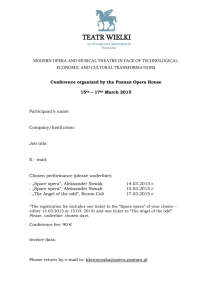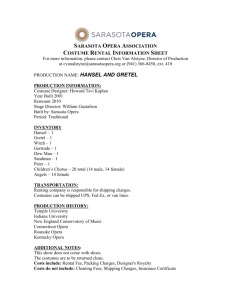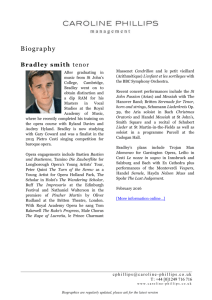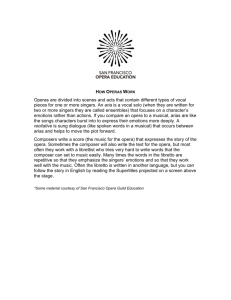21M.410 / 21M.515 Vocal Repertoire and Performance Spring 2005
advertisement
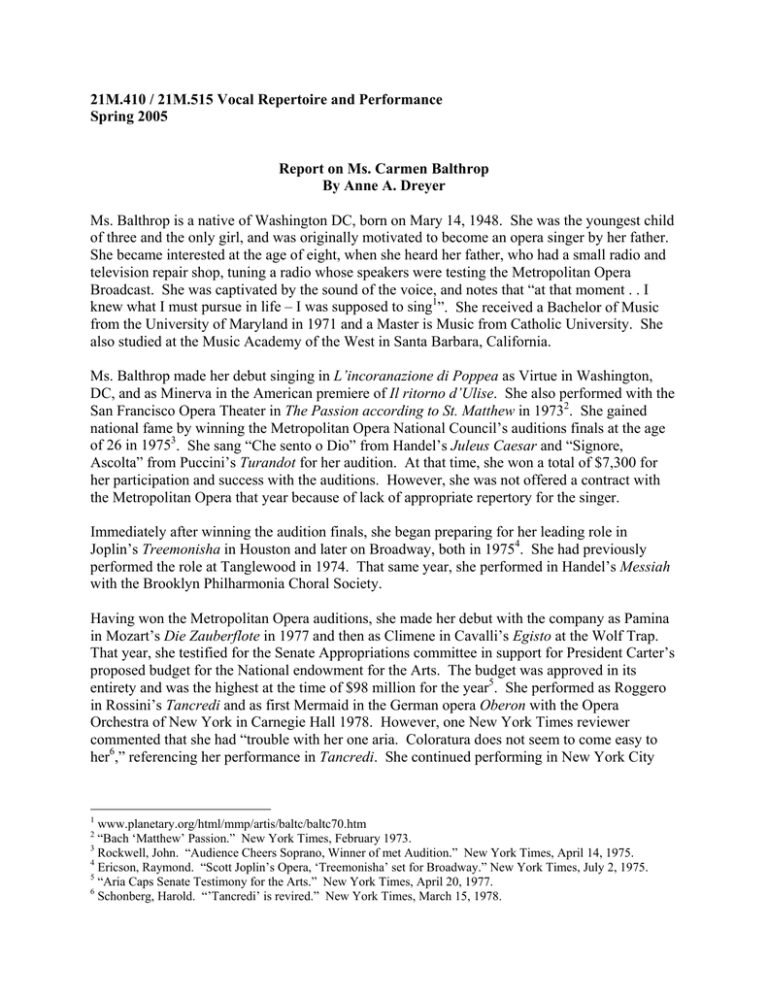
21M.410 / 21M.515 Vocal Repertoire and Performance Spring 2005 Report on Ms. Carmen Balthrop By Anne A. Dreyer Ms. Balthrop is a native of Washington DC, born on Mary 14, 1948. She was the youngest child of three and the only girl, and was originally motivated to become an opera singer by her father. She became interested at the age of eight, when she heard her father, who had a small radio and television repair shop, tuning a radio whose speakers were testing the Metropolitan Opera Broadcast. She was captivated by the sound of the voice, and notes that “at that moment . . I knew what I must pursue in life – I was supposed to sing1”. She received a Bachelor of Music from the University of Maryland in 1971 and a Master is Music from Catholic University. She also studied at the Music Academy of the West in Santa Barbara, California. Ms. Balthrop made her debut singing in L’incoranazione di Poppea as Virtue in Washington, DC, and as Minerva in the American premiere of Il ritorno d’Ulise. She also performed with the San Francisco Opera Theater in The Passion according to St. Matthew in 19732. She gained national fame by winning the Metropolitan Opera National Council’s auditions finals at the age of 26 in 19753. She sang “Che sento o Dio” from Handel’s Juleus Caesar and “Signore, Ascolta” from Puccini’s Turandot for her audition. At that time, she won a total of $7,300 for her participation and success with the auditions. However, she was not offered a contract with the Metropolitan Opera that year because of lack of appropriate repertory for the singer. Immediately after winning the audition finals, she began preparing for her leading role in Joplin’s Treemonisha in Houston and later on Broadway, both in 19754. She had previously performed the role at Tanglewood in 1974. That same year, she performed in Handel’s Messiah with the Brooklyn Philharmonia Choral Society. Having won the Metropolitan Opera auditions, she made her debut with the company as Pamina in Mozart’s Die Zauberflote in 1977 and then as Climene in Cavalli’s Egisto at the Wolf Trap. That year, she testified for the Senate Appropriations committee in support for President Carter’s proposed budget for the National endowment for the Arts. The budget was approved in its entirety and was the highest at the time of $98 million for the year5. She performed as Roggero in Rossini’s Tancredi and as first Mermaid in the German opera Oberon with the Opera Orchestra of New York in Carnegie Hall 1978. However, one New York Times reviewer commented that she had “trouble with her one aria. Coloratura does not seem to come easy to her6,” referencing her performance in Tancredi. She continued performing in New York City 1 www.planetary.org/html/mmp/artis/baltc/baltc70.htm “Bach ‘Matthew’ Passion.” New York Times, February 1973. 3 Rockwell, John. “Audience Cheers Soprano, Winner of met Audition.” New York Times, April 14, 1975. 4 Ericson, Raymond. “Scott Joplin’s Opera, ‘Treemonisha’ set for Broadway.” New York Times, July 2, 1975. 5 “Aria Caps Senate Testimony for the Arts.” New York Times, April 20, 1977. 6 Schonberg, Harold. “’Tancredi’ is revired.” New York Times, March 15, 1978. 2 with the next year in the first American Production of Erismena by Pier Francesco Cavalli with the New York Opera Theater Company. Having gained international acclaim, Carmen Balthrop traveled to Spoleto (1979), Insbruck (1980) and Santa Fe (1986) to perform Monteverdi’s Poppaea. She sang Poppaea in Handel’s Agrippina (1983) in Venice and as Gluck’s Eurydice in (1982). She speaks German and sings in 10 languages. Keeping her ties to the North American opera companies, she performed the role of Marzellina in Fidelio with the Festival Opera in Queens New York in 1980 and In William Grant Still’s A Bayou Legend shown on WNET-TV in New York in 1981. She appeared with Michigan Opera Theater between 1882 and 1884 as Treemonish and Pamina7. Appearences in Verdi’s Requiem, Mozart’s Ave Verum Corpus and Foss’s Elegy for Ann Frank followed in 1990 with the Brooklyn Philharmonic (1990) and in Bizet’s rarely heard one-act comic opera Djamileh with the American Symphony Orchestra (1994). As a recitalist, she has performed in the White House, Kennedy Center, and Carnegie Hall. She also performed a concert on National Public Radio on Christmas day of a live Christmas song recital, perfomed at the national Gallery of Art in Washington, DC. Most recently, Ms. Balthrop has performed for President Nelson Mandela8. Ms Balthrop’s discography includes title roles of Scott Joplin’s Treemonisha, Monteverdi’s L’Incoronazione di Poppea. She also recently released a compact disc entitled The Art of Christmas in 2004. Ms. Balthrop is currently an associate professor of voice at the University of Maryland School of Music and has been teaching music since 1985. She now heads the Vocal Division at the University of Maryland. She is also a member of the University of Maryland Alumni Hall of Fame and has been awarded the President’s Commission on Women’s Issues Women of Color Award in 2002. She has two daughters, ages 18 and 25. Her 18-year-old daughter is enrolled at University of Maryland as a flute and voice major9. 7 Sadie, Stanley, Ed. “The Grove Dictionary of Opera.” Volume One. London, the Macmillan Press Limited, 1992. www.balthrop.net 9 http://www.diamondbackonline.com/News/Diamondback/archives/2004/02/20/news5.html 8
